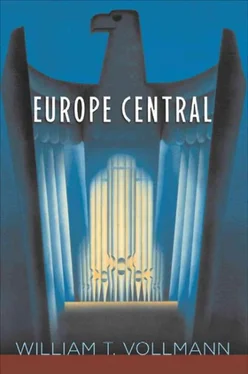William T. Vollmann
EUROPE CENTRAL
This book is dedicated to the memory of Danilo Kis, whose masterpiece A Tomb for Boris Davidovich kept me company for many years while I was preparing to write this book.
The majority of my symphonies are tombstones.
—D. D. Shostakovich
For the convenience of my countrymen who lose their way in Russian novels.
Akhmatova [Gorenko], Anna Andreyevna
Arnshtam, Leo Oskarovich
Danchenko, Natalya Kovalova
Denisov, Edison Vasiliyevich. Nickname: Edik.
Glikman, Isaak Davidovich
Glivenko, Tatyana Ivanovna
Kainova, Margarita Andreyevna
Karmen, Roman Lazarevich
Konstantinovskaya, Elena [Yelena] Evseyevna. Nicknames: Elenka, Elenochka, Lyalya, Lyalka, Lyalotchka.
Krupskaya, Nadezhda Konstantinovna
Lebedinsky, Lev Nikolayevich
Lenin [Ulyanov], Vladimir Ilyich. Often called Ilyich.
Litvinova, Flora Pavlovna
Nikolayevna, Tatyana Petrovna
Rostropovich, Mstislav Leopoldovich
Shebalina, Alisa Maximova
Shostakovich, Dimitri Dimitriyevich. Nicknames: Mitya, Mitenka, etc.
Shostakovich, Galina Dimitriyevich. Nicknames: Galya, Galisha, Galotchka.
Shostakovich, Mariya Dimitriyevna. Nickname: Mariyusha.
Shostakovich, Zoya Dimitriyevna
Supinskaya [later Shostakovich], Irina Antonova. Nicknames: Irinotchka, Irinka.
Ustvolskaya, Galina Ivanovna
Varzar [later Shostakovich], Nina Vasilyevna. Nicknames: Ninotchka, Ninusha, Ninka, Nita.
Vlasov, Andrei Andreyevich
VIEW FROM A RUINED ROMANIAN FORT

(1945)
STEEL IN MOTION

As often as not, the things that attract us to another person are quite trivial, and what always delighted me about Blumentritt was his fanatical attachment to the telephone.
—Field-Marshal Erich von Manstein (1958)
1
A squat black telephone, I mean an octopus, the god of our Signal Corps, owns a recess in Berlin (more probably Moscow, which one German general has named the core of the enemy’s whole being ). Somewhere between steel reefs, a wire wrapped in gutta-percha vibrates: I hereby… zzzzzzz… the critical situation… a crushing blow. But because these phrases remain unauthenticated (and because the penalty for eavesdropping is death), it’s not recommended to press one’s ear to the wire, which bristles anyhow with electrified barbs; better to sit obedient, for the wait can’t be long; negotiations have failed. Away flees Chamberlain, crying: Peace in our time. France obligingly disinterests herself in the Prague government. Motorized columns roll into snowy Pilsen and keep rolling. Italy foresees adventurism’s reward, from which she would rather save herself, but, enthralled by the telephone, she somnambulates straight to the balcony to declare: We cannot change our policy now. We are not prostitutes. The ever-wakeful sleepwalker in Berlin and the soon-to-be-duped realist in the Kremlin get married. This will strike like a bomb! laughs the sleepwalker. All over Europe, telephones begin to ring.
In the round room with the fan-shaped skylight, with Greek gods ranked behind the dais, the Austrian deputies sit woodenly at their wooden desks, whose black rectangular inlays enhance the elegance; they were the first to accept our future; their telephone rang back in ’38. Bulgaria, denied the British credits which wouldn’t have preserved her anyway, receives the sleepwalker’s forty-five million Reichsmarks. The realist offers credits to no one but the sleepwalker. Shuffling icons like playing cards, Romania reiterates her neutrality in hopes of being overlooked. Yugoslavia wheedles airplanes from Germany and money from France. Warsaw’s humid shade is already scented with panic-gasps. The wire vibrates: Fanatical determination… ready for anything.
According to the telephone (for perhaps I did listen in once, treasonously), Europe Central’s not a nest of countries at all, but a blank zone of black icons and gold-rimmed clocks whose accidental, endlessly contested territorial divisions (essentially old walls from Roman times) can be overwritten as we like, Gauleiters and commissars blanching them down to grey dotted lines of permeability convenient to police troops. Now’s the time to gaze across all those red-grooved roof-waves oceaning around, all the green-tarnished tower-islands rising above white facades which grin with windows and sink below us into not yet completely telephone-wired reefs; now’s the time to enjoy Europe Central’s café umbrellas like anemones, her old grime-darkened roofs like kelp, her hoofbeats clattering up and bellnotes rising, her shadows of people so far below in the narrow streets. Now’s the time, because tomorrow everything will have to be, as the telephone announces, obliterated without warning, destroyed, razed, Germanified, Sovietized, utterly smashed. It’s an order. It’s a necessity. We won’t fight like those soft cowards who get held back by their consciences; we’ll liquidate Europe Central! But it’s still not too late for negotiation. If you give us everything we want within twenty-four hours, we’ll compensate you with land in the infinite East.
In Mecklenburg, we’ve prepared a demonstration of the world’s first rocket-powered plane. Serving the sleepwalker’s rapture, Göring promises that five hundred more rocket-powered planes will be ready within a lightning-flash. Then he runs out for a tryst with the film star Lida Baarova. In Moscow, Marshal Tukhachevsky announces that operations in a future war will unfold as broad maneuver undertakings on a massive scale. He’ll be shot right away. And Europe Central’s ministers, who will also be shot, appear on balconies supported by nude marble girls, where they utter dreamy speeches, all the while listening for the ring of the telephone. Europe Central will resist, they say, at least until the commencement of Case White. Every man will be issued a sweaty black machine-carbine, probably hand-forged, along with ten round lead bullets, three black pineapple grenades each not much larger than a pistol grip, and a forked powder horn of yellowed ivory adorned with circle-inscribed stars…
The telephone gloats: Liberating advance… shock armies… ratio of mechanized forces.
Across the next frontier, where each line of fenceposts leans away from the other, our shared victim’s proud military poets dull all apprehensions by equating Warsaw 1939 with Smolensk 1634. While they dispose their hopeless echelons, we draw the Ribbentrop-Molotov Line, on which we stamp  , which means secret. And why stop there? The sleepwalker gets Lithuania, the realist Finland. Our creed’s a lamp whose calibrated radiance bows down into its zone. It was and is Jews who bring the Negroes into the Rhineland. That is precisely why the Party affirms that Trotskyism is a Social-Democratic deviation in our Party. The telephone rings; General Guderian receives his instructions to activate Case Yellow. We’ll whirl away Europe Central’s wine-tinted maple leaves and pale hexagonal church towers.
, which means secret. And why stop there? The sleepwalker gets Lithuania, the realist Finland. Our creed’s a lamp whose calibrated radiance bows down into its zone. It was and is Jews who bring the Negroes into the Rhineland. That is precisely why the Party affirms that Trotskyism is a Social-Democratic deviation in our Party. The telephone rings; General Guderian receives his instructions to activate Case Yellow. We’ll whirl away Europe Central’s wine-tinted maple leaves and pale hexagonal church towers.
Читать дальше






 , which means secret. And why stop there? The sleepwalker gets Lithuania, the realist Finland. Our creed’s a lamp whose calibrated radiance bows down into its zone. It was and is Jews who bring the Negroes into the Rhineland. That is precisely why the Party affirms that Trotskyism is a Social-Democratic deviation in our Party. The telephone rings; General Guderian receives his instructions to activate Case Yellow. We’ll whirl away Europe Central’s wine-tinted maple leaves and pale hexagonal church towers.
, which means secret. And why stop there? The sleepwalker gets Lithuania, the realist Finland. Our creed’s a lamp whose calibrated radiance bows down into its zone. It was and is Jews who bring the Negroes into the Rhineland. That is precisely why the Party affirms that Trotskyism is a Social-Democratic deviation in our Party. The telephone rings; General Guderian receives his instructions to activate Case Yellow. We’ll whirl away Europe Central’s wine-tinted maple leaves and pale hexagonal church towers.










